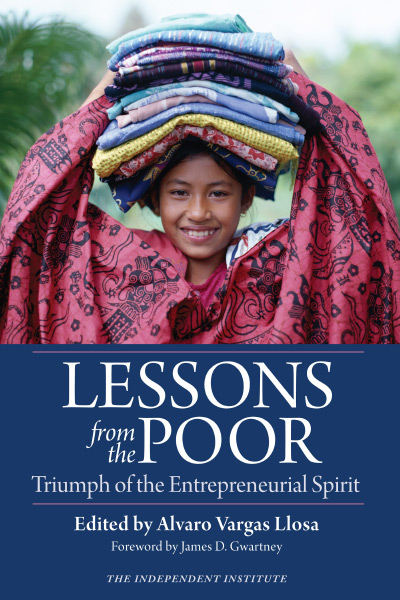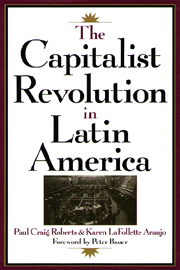| List Price: | ||
| Price: | $12.70 | |
| Discount: | $4.25 (Save 25%) |
| List Price: | ||
| Price: | $12.70 | |
| Discount: | $4.25 (Save 25%) |
Overview
Half the people in the world live on two dollars or less per day and roughly 600 million live on no more than one dollar per day. With thousands of international relief organizations, strategic government programs, and billions of dollars in foreign aid, why do so many underdeveloped countries remain unable to grow their economies beyond mere survival?
It is this issue that internationally acclaimed political analyst Alvaro Vargas Llosa and a select group of economists examine in a series of case studies from around the world. These studies reveal that entrepreneurial energy can be a persistent catalyst for change. But unfortunately in societies dominated by political corruption and unnecessary regulation, men and women seeking to innovate must hurdle a series of challenges. Wealth transfer, favoritism, excessive taxation, and lack of institutional security all conspire against progress. Our contributors examine real world examples of entrepreneurship and argue that instead of redistributing existing wealth, developing countries should start working to create it.
Contents
Foreword
James D. Gwartney
Introduction: Lessons from the Poor
Alvaro Vargas Llosa
1. Amid Hopelessness, Hopeful Investment
Daniel Córdova
2. Defeating Poverty Doing Business
Daniel Córdova
3. Nakumatt: A Kenyan Supermarket
June Arunga and Scott Beaulier
4. The Nigerian Clothing Design Industry
Thompson Ayodele
5. Barter Clubs in Argentina
Martín Simonetta, Gustavo Lazzari, and Gabriel Gasave
6. Freedom, Entrepreneurship, and Economic Growth
Joshua C. Hall and Russell S. Sobel
Detailed Summary
- The entrepreneurial spirit often operates under adverse conditions; sometimes it even thrives despite major obstacles. To cite the case studies from Lessons from the Poor: a small Peruvian family farm, in a remote area overrun by terrorists, created a soft-drink company that now runs factories in several countries; a poor car washer with no capital went on to develop Peru’s largest textile firm; a shopkeeper who sold blankets and mattresses developed a large supermarket chain that is improving the quality of life in Kenya; thousands of Nigerian women with little schooling own clothing dyeing and design businesses, many of them out-earning government employees and private-sector managers; and millions of consumers in Argentina sidestepped the inflation, taxation, and regulations that plagued the mainstream economy by joining barter clubs that eventually developed their own currencies.
- Entrepreneurship in the developing world has alleviated poverty more effectively than has foreign aid. Corruption, bureaucracy, and the suppression of local markets have long made development assistance unproductive—or even counterproductive. In contrast, private-sector entrepreneurs have brought affordable goods and productive jobs to large populations of low-income people. In Peru, without the benefit of government aid, Aquilino Flores started a firm that now employs 5,000 workers worldwide and the Añaños family started a firm twenty years ago that now employs 8,000 on three continents. Taking pride in having turned her $167 in savings into a $12,000 business, Nigerian clothing designer T. A. Animashaun states, “I have sponsored seven children and now I feed ten children daily, besides my having acquired assets worth more than $35,500.”
- Legal and regulatory obstacles to entrepreneurship create hardship for countless people in the developing world. In Kenya it takes 8 steps and 73 days to register property, 13 steps and 54 days to launch a business, and 25 steps and 360 days to enforce contracts. Consequently, many entrepreneurs are driven to sell goods not through legal businesses, but at tiny kiosks in the informal economy, on whatever unclaimed space they can find. Unfortunately, because the kiosks are not legally recognized as property, few kiosk operators can obtain credit, so their prospects for upward mobility are very limited. Rather than legitimizing the kiosks, Kenya’s government has begun to demolish them.
- Eliminating international trade barriers allows innovative entrepreneurs in developing countries to leverage their successes by reaching millions more customers. The opening up of trade in the 1990s enabled Kola Real to transplant the strategies it employed successfully in the small ($160 million) Peruvian soft-drink market to Mexico’s huge ($1.2 billion) soft-drink market, where it now has a respectable 10% market share. When the protectionist Multifiber Agreement was scrapped in the late 1990s, growth in the garment trade accelerated worldwide. Peruvian textile exporter Topy Top views the opening of trade with China, India, and Pakistan, as well as the Free Trade Agreement of the Americas, not as threats but as opportunities to reduce costs by purchasing cheaper inputs and to sell in huge markets.
Entrepreneurship is not the exclusive preserve of the developed countries—it can be found even in poor counties not known for innovation and free enterprise. In fact, millions of small-scale entrepreneurs manage to eke out a living, often in highly creative ways, despite significant obstacles posed by stagnant economies, stifling bureaucracies, and despotic governments. In examining recent examples of successful entrepreneurs who have prevailed against the odds, the contributors to Lessons from the Poor, edited by Alvaro Vargas Llosa (Senior Fellow, The Independent Institute) suggest that the desire to improve one’s material circumstances is an ever-present condition of the human spirit.
Through a series of case studies of entrepreneurs in Latin America and Africa, Lessons from the Poor sheds light on how public policies have helped or hindered entrepreneurship and economic development. The book examines the business strategies and practices that have enabled small-scale entrepreneurs—individuals who possessed very little means but an abundance of vision and tenacity—to flourish beyond all reasonable expectations.
“All of the stories that make up this series were extensively researched on location by the various authors and their support teams,” writes Vargas Llosa in the book’s introduction. “Together, they provide a tantalizing account of the potential and the achievements of poor people in Peru, Argentina, Nigeria, and Kenya, and of the way in which countries that were once deemed poor and hopeless, such as Spain, Vietnam, and Estonia, have seen their economic fortunes turn despite persistent problems.”
Peru’s Top Soft-Drink Maker
The book begins with two success stories from Peru. The first is Kola Real, a soft-drink company founded in the late 1980s on the Añaños family’s farm in the Peruvian Andes.
By most accounts, Peru in those years was an unlikely birthplace for a fast-growing start-up that would challenge established giants like Coca-Cola, explains Daniel Córdova in the chapter, “Amid Hopelessness, Hopeful Investment.” The militant group Shining Path dominated parts of the countryside, and Peru’s leaders were pounding the economy into the ground by nationalizing industries, erecting trade barriers, accelerating money supply growth to hyperinflationary levels, and scaring off foreign investment.
Peru’s political and economic turmoil made it increasingly difficult for the leaders of its soft-drink market to operate profitably, but the Añaños family saw opportunity in the chaos. What they lacked initially in financial resources, marketing acumen, and distribution capabilities, they made up for with enthusiasm. They focused initially on low-income rural consumers, who were motivated more by low prices than by brand loyalties. They also sought low-cost production methods, overcame barriers imposed by competitors, forged alliances with suppliers and clients, innovated novel methods of marketing and promotion, managed their finances prudently, and continually developed new products.
The results have been phenomenal. Kola Real’s regional soft-drink, Big Cola, trails only Coca-Cola, Pepsi, and Sprite. By 2002, the company made an estimated $1 billion in annual sales; owned fourteen manufacturing plants, with a two billion liter annual capacity; and had subsidiaries in Mexico, Venezuela, Ecuador, four Central American countries, and Thailand.
Peru’s Leading Textile Company
The second case study from Peru is a rags-to-riches story—literally. In the mid-1960s, Aquilino Flores, who had no capital, was washing cars for a living when he began to sell cotton T-shirts at the car washes. By 2007, the company he founded, Topy Top, was Peru’s leading textile and garment exporter, generating annual sales greater than $100 million. Daniel Córdova examines Topy Top and its spectacular rise in the chapter “Defeating Poverty Doing Business.”
Flores and his family seized opportunities that arose unexpectedly. They studied their customers’ preferences. They located their plants in areas with experienced textile workers and encouraged worker loyalty. They learned how to succeed first in the informal economy, then in poorer rural markets, and finally in developed countries. They created their own dye factories and vertically integrated their production. They opened retail stores in countries to which they exported goods. They managed their finances conservatively and strove toward increased professionalism.
Although Topy Top’s success was made easier by tax cuts, trade liberalization, and other reforms of the 1990s, it was fundamentally a success of the company’s own making.
Kenya’s New Supermarkets
Until recently, Kenya’s consumers were limited to a narrow range of locally produced foods and unreliable goods sold primarily at kiosks. Since the mid-1990s, however, Kenyans have been able to purchase a growing variety of reputable products in supermarkets located in the bigger cities, explain June Arunga and Scott Beaulier in the chapter, “Nakumatt: A Kenyan Supermarket.”
When Nakumatt was founded in 1980s, it was a small retail shop selling blankets and mattresses in Nakuru, Kenya’s fourth largest city. Today, Nakumatt is a retail giant with 3,000 employees and a prestigious award for East Africa’s Most Respected Company in the Service Sector. Reasons cited for Nakumatt’s success include high levels of customer care and its partnerships with other companies, including the subletting of space in its stores to other retailers.
Nakumatt’s human resource policies are key to its success. New hires must meet an educational and conduct standard. Then they go through a three-month training program that teaches them about the whole company. Unlike most companies, Nakumatt recruits all managers from within; thus, an employee might start out as a delivery driver and within six years become a branch manager. These policies help cultivate in employees a strong work ethic and a sense of belonging.
Nigeria’s Clothing Designers
Thompson Ayodele’s chapter, “The Nigerian Clothing Design Industry,” looks at a business that is both highly entrepreneurial and traditional in Yoruba culture. The colors and patterns of adire attire communicate one’s mood and status in ways readily understood by average people. The production-to-sale process begins with preparation of dyes made from elu tree leaves, follows with the dyeing of cloth, and concludes with the cash sale of the clothing to the retailer after a physical meeting.
Although nearly half of the 5,000 or so adire workers are self-employed, many of them have done well. The bottom nineteen percent of the 1,100 entrepreneurs polled for this chapter earned more than state and federal government civil servants, who are paid the minimum wage. More significantly, the top forty percent of them earn as much or more than managers in both the private and public sectors. This is especially notable because about seventy percent of adire entrepreneurs are women with little formal schooling and few alternatives for earning a living.
Unfortunately, Nigeria’s regulations make it hard for them to sell directly overseas to the growing market of Nigerians living abroad, which severely limits the income potential of the adire entrepreneurs.
Barter Clubs in Argentina
Many entrepreneurs set out to make a good living by seizing an unnoticed profit opportunity. Others start their enterprise mainly in response to barriers, often government imposed, to other avenues of making ends meet. A notable example of the latter kind is examined in the chapter, “Barter Clubs in Argentina: The Market’s Response to the Failure of the State,” by Martín Simonetta, Gustavo Lazzari, and Gabriel Gasave.
Argentina’s barter clubs started in the mid-1990s, as a way for members to obtain goods and services while avoiding taxes and reducing their need to hold a rapidly depreciating currency. The clubs became more useful to their members as they grew, because more goods and services were available for barter.
Although about 200,000 people joined clubs in 1999, their membership swelled to an estimated 2.5 to 6 million members during the economic crisis of 2001-2002. Because keeping track of members’ accounts was becoming increasingly difficult, the clubs developed a private currency their members considered reliable—unlike the government-issued pesos whose value had fallen seventy percent.
Freedom, Entrepreneurship, and Economic Growth
The book concludes with a look at the legal and political foundations of productive entrepreneurship. Entrepreneurship is socially productive to the extent that economic freedom exists in a society, because economic freedom tends to channel entrepreneurial activity into wealth creation, whereas the lack of economic freedom tends to channel it into wealth redistribution through crime, corruption, and political patronage, explain Joshua C. Hall and Russell S. Sobel in the chapter, “Freedom, Entrepreneurship, and Economic Growth.”
Ranking countries by their levels of economic freedom and rates of entrepreneurship is useful for making comparisons and evaluating policy changes. For example, relating the changes in the Economic Freedom of North America index to changes in the Kauffmann Index of Entrepreneurial Activity suggests that if West Virginia were to become as economically free as Massachusetts, its growth rate of entrepreneurship would be five percent higher. Similarly, relating the Economic Freedom of the World index to data from the Global Entrepreneurship Monitor shows that when the level of taxation, transfers, and subsidies goes down, the most productive types of entrepreneurship go up.
Praise
“Many people are naturally entrepreneurial, but the spirit of enterprise can be easily discouraged by government restrictions or a culture of conformity. Many poor countries have suffered from bad government and unnecessary regulations that discourage small-firm formation and growth. The important book Lessons from the Poor provides informative case studies of how good government has fostered entrepreneurship and economic development in some of the poorest countries of the world.”
—Mark C. Casson, Professor of Economics and Director, Centre for Institutional Performance, University of Reading, England
“When we think about fighting poverty, we mostly listen to the rich—western businessmen, policymakers and academics. This wonderful, inspiring book gives us the advice from the poor.”
—Fareed Zakaria, Editor, Newsweek International; Host, CNN’s Fareed Zakaria GPS; and Co-host, PostGlobal
“Lessons from the Poor shows that the mightiest soldiers in the war on poverty are poor people themselves. This fascinating book documents the remarkable creativity and entrepreneurship of the poor, ranging from the family grocer in Kenya that became a supermarket giant to the makers of traditional dyed cloth in the informal sector in Nigeria, who make as much money as corporate managers in the formal sector. The message of the book is profoundly hopeful—as governments remove obstacles to entrepreneurship, there is much potential for the poor to lift themselves out of poverty.”
—William R. Easterly, Professor of Economics and Director, Development Research Institute, New York University
“Discovering the root causes of poverty in the Third World and attempting to combat them has become a billion-dollar industry in itself. Yet, according to the Independent Institute, international aid efforts may only serve to hinder rather then encourage economic development. Lessons from the Poor: Triumph of the Entrepreneurial Spirit chronicles the successes of Third World entrepreneurs who lifted themselves up from poverty and overcame obstacles (particularly the labyrinth of government regulations) to become successful business owners. . . . Ultimately, as the Independent Institute’s study shows, free enterprise and the extraordinary fortitude and vision of Third World entrepreneurs do play significant roles in alleviating poverty.”
—The Futurist
“Of interest is a new book from the Independent Institute. . . . The new volume bears an intriguing title: Lessons from the Poor. The book returns you to the basics of economic life, and even somewhat to life itself. . . . I intend to keep this book on my shelf, for factual reference and even, perhaps, for inspiration. One of the glories of this book is that there is nothing ideological about it. It simply searches the questions, ‘What works and why?’ Material progress is not everything in life, but, as V. S. Naipaul once observed, the poor need it—and they could have it, if only others would get off their throats. . . . This is a valuable and emboldening book. It says, in a nutshell, that the remedy for Third World poverty is entrepreneurship—not socialism, not mindless foreign aid, and surely not Western guilt. But entrepreneurship. To me, the book's arguments are irrefutable. And so is the experience of the last many decades.”
—National Review
“Why isn't a Bill Gates or a Steve Jobs born in Honduras? I mean, why is it that creative people don't emerge in the Third World, capable of developing innovative products and building companies that market those products, create jobs, generate large profits and influence decisively the fate of this planet? . . . Alvaro Vargas Llosa attempts to answer that nagging question in a book that's extraordinarily important for the great debate over development: Lessons from the Poor, published by the Independent Institute. The book, written by several important economists, compiled and given a foreword by Alvaro, who heads the Center on Global Prosperity, compiles five cases of remarkable entrepreneurial successes achieved by poor people under very adverse conditions. Two of them occurred in Peru, another in Argentina, and the others in Nigeria and Kenya.”
—Miami Herald
“This book offers great reading for any person seriously dedicated to the elimination of poverty. Its very cover contains five good reasons for assuring this: the title’s implication that the poor themselves can teach us by their own example how they were able to overcome their poverty; its further implication that the secret of their progress is ‘entrepreneurial spirit’; the editorship of Alvaro Vargas Llosa; the foreword by Liberty Index guru, Jim Gwartney; and the publisher, the respected Independent Institute. The jacket unsurprisingly turns out to be the preamble of an outstanding treatment unique among treatises on poverty that have crossed my path. Ostensibly, Lessons from the Poor tells us five stories about the unbelievable success of fledgling entrepreneurs under the most discouraging conditions. . . . All this is topped by a fantastic essay (win econometric backing) on the need for entrepreneurship to create growth and progress. . . . It is the story of how entrepreneurs seem to have appeared from nowhere. . . . Each of the articles aptly describe the hostile environments and the weak underlying social institutions that beleaguered these evolving enterprises, as well as the political obstacles, nationalizations, agrarian expropriation, complex regulations, exchange controls and prohibitions of all sorts, increased traffic, social and environmental experimentation, and the requirement to endure 360 days of bureaucratic niggling in order to get an idea started or to enforce contracts.”
—Journal of Markets and Morality
“Lessons from the Poor is a collection of essays apparently targeted for the non-economics specialist, although supported with copious citations. Intended to illustrate the maxim elucidated by the editor, Alvaro Vargas Llosa, that ‘entrepreneurship, not Western guilt, is the way to move forward.’ Case studies are drawn from Peru, Argentina, Kenya and Nigeria. The persistence and entrepreneurial brilliance of the individuals highlighted in these stories is undeniable. . . . The insights in the studies here are a useful addition to economic development literature . . .”
—Poverty & Public Policy
Awards
2010 Templeton Freedom Awards for Excellence in Promoting Liberty
- Winner: Free Market Solutions to Poverty
“In 2008, the Independent Institute uncovered compelling evidence of the entrepreneurial energy that is the true catalyst of economic progress. In this book Alvaro Vargas Llosa and a select group of economists examined real world examples of successful entrepreneurship. They argue that instead of distributing wealth, developing countries should work to create it. The book examines the business strategies that have enabled individuals with very little means except a wealth of vision and tenacity, to flourish beyond all reasonable expectations. The story-telling style of the book and its effective way of connecting with the general public increases its appeal.”















